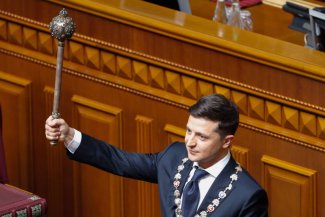Ukraine: inauguration of the president and dissolution of parliament

On 20 May, Volodymyr Zelenskiy was sworn in as the new president of Ukraine. In his inaugural address, he reiterated his campaign attacks on the current, now discredited political elite, which has lost favour with the public. The climax of the speech was an announcement of a decision to dissolve parliament early. The next day, the president issued a decree setting a date for early elections to the Verkhovna Rada, 21 July. Zelenskiy also demanded, in the same speech, that members pass three laws within 60 days, one abolishing parliamentary immunity, one introducing penalties for officials for unlawful enrichment, and one introducing a new electoral code. He has also demanded the resignation of the head of Ukraine’s Security Service, the prosecutor general, and the minister of defence, who, under the Constitution, are appointed by the president.
A few hours after the inauguration, Prime Minister Volodymyr Hroisman announced he was resigning, which will mean the dismissal of his entire cabinet. Hroisman stated in his speech that responsibility for the way in which the country now develops rests with the new president, and that he would be running in the election for a seat on the Verkhovna Rada.
Commentary
- While the inaugural address contained appealing rhetoric, it did not present a clear vision for developing the country and dealing with the most pressing issues. Zelenskiy’s decision to dissolve the Verkhovna Rada shows that the new president’s main priority at the moment is to quickly form a majority supporting him in in the next Verkhovna Rada, drawn from his party, Servant of the People. The basis for this plan is Zelenskiy’s huge popularity, which continues following the momentum generated by victory in the presidential campaign. An election poll published on 16 May gave his party, which does not have any structures or staff, support of almost 40% and a fourfold advantage over the other parties. The Pro-Russian Opposition Platform – For Life, as well as Petro Poroshenko’s Bloc and Yulia Tymoshenko’s Batkivshchyna, can each expect to garner around 10% support.
- The basis for the ruling dissolving the Verkhovna Rada is the fact that the coalition of Poroshenko’s Bloc and the National Front have not enjoyed a parliamentary majority since 2016. Meanwhile, art. 90 of the Constitution gives the president the power to dissolve parliament early if a coalition with a majority is not formed within one month. However, because it is not specifically stated in Ukrainian law who should officially determine that there is no majority coalition, and in what manner, the president’s decision is questionable from a legal point of view. Some forces within parliament believe this decision to be unconstitutional, and the Chair of the Verkhovna Rada has said that it will be challenged before the Constitutional Court. The view that parliament cannot be lawfully dissolved is based on the formal assertion of 17 May that as the National Front left the pro-government coalition, the coalition ceased to exist; This means that members of parliament have 30 days to form a new coalition. Commentaries suggest however that Zelenskiy’s decision has been accepted by most of the major political players. There are many indications that an unofficial consensus has now been reached concerning early elections with representatives of some parties. It appears that Petro Poroshenko’s faction is also in favour of proceeding in this direction, in order to capitalise on the mobilisation of Poroshenko’s electorate that took place during the presidential campaign. An official party statement has been released saying that although the president’s decision is unconstitutional, the formation is willing to take part in early elections.
- Prime Minister Volodymyr Hroisman has said that the reason for his resignation is the lack of will to cooperate on the part of the newly elected president and his appeal for the cabinet to resign. He also announced that responsibility for forming a new government and the overall condition of the country now rests with the president. This step, and the accompanying remarks, should be seen in practice as the beginning of Hroisman’s parliamentary election campaign. A few weeks ago, Hroisman announced he would be running independently for a seat on the Verkhovna Rada. The next few days will probably see an announcement of the launch of the prime minister’s new political formation, and of the names of his political partners.
- By law, if the prime minister resigns the entire cabinet is dismissed. The current government will however remain in power temporarily until a new cabinet is formed. As there is no parliamentary majority in the existing parliament, the Verkhovna Rada will probably not be capable of appointing a new government before the election. This would render it impossible for the government to make any decisions important for the country over the next two months, and parliament’s activities will be subjugated to the election campaign. This will enable the president to attack members of parliament, who will not be inclined in the near future to institute any major legislative initiatives, above all the three laws that Zelenskiy is demanding, as described above. At the same time, this will be ammunition for the president’s critics to blame him for the paralysis in the country caused by the decision to dissolve parliament and dismiss the government.
- Dissolving parliament and dismissing the government will destabilise the Ukrainian political scene. Some parliamentary parties can be expected to collapse in the coming weeks, including Petro Poroshenko’s Bloc and the National Front, and new formations will probably be created. President Zelenskiy on the other hand will be building the party Servant of the People, which at the moment has no structures or staff, using members of his administrative apparatus. In this context, the appointment as head of the president’s administration of Andriy Bohdan, who has links to oligarch Ihor Kolomyskyi, owner of one of Ukraine’s largest television stations, is a significant development. At the same time, Zelenskiy will try to maintain the huge popularity of his party, among other things by discrediting the activities of the government and the current parliament.




